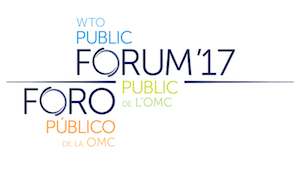From the G20 hamburg summit to MC11 in Buenos Aires – Smooth path or bumpy road?
27 Sep 2017 14:00h - 15:30h
Event report
[Read more session reports from WTO Public Forum 2017]
Opening the session, Mr Martín Piñeiro, Director of the Argentinian Council for International Relations (CARI), Special Adviser to the Director-General of UNFAO, introduced the theme of the session, whose focus would be on policy considerations from both the G20 and the 11th WTO Ministerial Conference (MC11) processes. In his view, there were five umbrella topics for the discussion:
- Globalisation has had negative impacts on inequality and employment, and has generated a political resistance which effects the behaviour of governments. This resistance has permeated the trade discussions.
- Yet, whereas trade is part of globalisation, its contribution to inequality and unemployment is quite small, with a much bigger role being played by technology transformations and financial systems. It is for this reason that trade needs to be separated in the discussion and linked back to development.
- Inequality and inclusiveness need to be addressed.
- The impact of inequality is different among social groups in all countries and this has implications for the groupings within the WTO.
- Global trade rules are essential for general well-being, in particular for small and developing countries.
The first panellist, Mr Axel Berger,Researcher at the German Development Institute (Deutsches Institut für Entwicklungspolitik, DIE, Department for World Economy and Development Finance, Bonn, discussed the outcomes of the Hamburg G20 Summit, reflecting on the bumpy road that led to it. In 2016, when China chaired the G20, many significant steps were taken towards a broadening of the debate on trade measures, including the establishment of a Trade and Investment Working Group. However, during the German presidency of the G20, trade did not originally feature as a priority, partly because of the related EU competences. However, following the Digital Ministers meeting, three priorities emerged clearly:
- Support for the multilateral trading system
- Digital economy
- Investment facilitation
At the Hamburg Summit earlier this year – which took place in a more turbulent political context, and was marked by the retreat of the US – achievements included: more stringent commitments on access capacity, a broadening of the scope of legitimate protectionism, alongside support for the WTO, without a big push for MC11. Weak commitments and language were noted on digital trade and on investment, whereas the anti-protectionist pledge remained ambiguous (commitment for open markets, but also ‘legitimate trade defence instruments’ or ‘unfair practices’ references).
Complementing the observations made by Berger, Mr Tim Yeend, Chef de Cabinet and Principle Adviser to the WTO Director–General, expressed hope that with Argentina taking over the presidency of the G20, trade will continue to be an integral part of the organisation’s work. At the Summit in Hamburg, the position of the US played a key role, as an accommodation was sought on issues such as the trade monitoring system, trade restrictive measures and access capacity. Getting consensus on trade-related issues can thus be considered an achievement for the G20. In his words, ‘G20 is a good complement to the work we do at the WTO; here, there is a much broader set of stakeholders’. The G20 process puts the discussion in a broader perspective.
In his presentation, Mr Ricardo Meléndez-Ortiz, Co-founder and Chief Executive Officer of the International Centre for Trade and Sustainable Development (ICTSD), focused on the unique contextualisation and leadership that the G20 offers, which could be used in the WTO as an opportunity to move forward on key issues. Since 2009, the G20 leaders have repositioned their discussions to enhance the coordination of economic policy. At the ‘helicopter level’ view at which the G20 leadership operates, there is recognition that we live in a complex regime, and more recently, an expressed interest in what should been done at the domestic level. The G20 plays a role in contextualising the trade agreements, with a clear commitment to work in support of the sustainable development goals (SDGs) and the 2030 Agenda. Concerted action and orchestration is needed in order to look at trade-related issues with a marathon mind, rather than a sprint mind, concluded Meléndez-Ortiz. Yet, it is the WTO that is more inclusive when it comes to tackling complex issues.
Representing the private sector, Ms Silvia Taurozzi,Senior Consultant and Representative in Europe, GPS, talked about the challenges and opportunities for Latin America. The GPS gathers private agribusiness institutions from Argentina, Brazil, Paraguay and Uruguay working on food security and sustainable development. Together, they view the role of Latin America as key in finding a solution to food security based on agriculture, as the region has one third of the world’s fresh water reserves and a quarter of the world’s medium to high potential farmland, with a total of 8.5% of the world’s population). Currently, Latin America has 30% of net agricultural exports, for which the demand is concentrated in big power net importing countries. In her view, the 2018 G20 agenda in Argentina is well focused, capturing the impact of technology and globalisation on structural unemployment and its implications of education, but it should also include a chapter on food security, climate change and commerce. She expressed hope that the private sector will be involved in the process.
The Q&A focused on expectations for the MC11 in December in Argentina. Panellists concurred that a new agreement is not likely to be concluded in Buenos Aires, but progress could be expected on issues of agriculture (domestic support and public stock-holding), fisheries subsidies, e-commerce, and investment facilitation. Support for the integrity of the multilateral trade system, complemented by new ideas and potentially new partnerships, are encouraging steps. There is a need to see this as a process and look beyond the Buenos Aires meeting, towards the medium-term goals. New alliances can be expected within the WTO, in particular on issues like e-commerce and investment facilitation.
by Roxana Radu
Related topics
Related event

